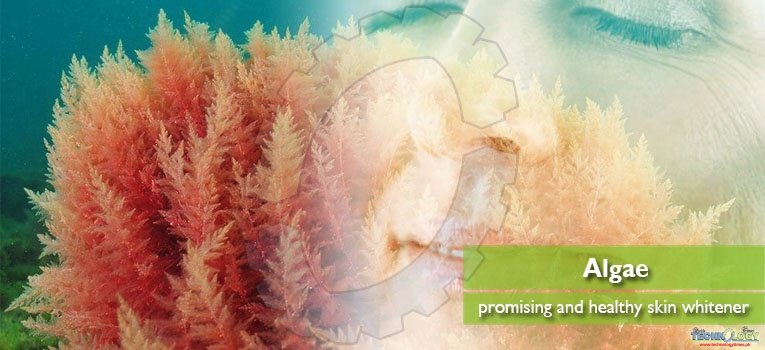Algae are not only good skin whiteners, but they are also anti-aging, photo-protective, and skin-health promoters. This is because they are rich source of proteins, vitamins, carbohydrates, copper, iron, zinc and many other elements.

Skin whitening have been in practice all over the world from ancient times. Skin whitening is a largest selling market especially in Asian countries, because white skin is considered as beauty standard. According to the report of SIRONA biochem, about $13bn is spent on skin care products in Asia Pacific.
The commercial skin whitening products are mostly chemical in nature, which are doing more harm than help. The whitening products commonly contain corticosteroids, mercury and hydroquinone, which have been attributed to cause skin cancer upon regular use.
The skin whitening products primarily target the inhibition of melanin production in body. The melanin is involved in imparting colour to our skin, hair and eyes. The active ingredient of whitening agents include tyrosinase inhibiting enzyme, as tyrosinase plays key role in melanogenesis (process of melanin production). Now, attention to find natural tyrosinase inhibitors is being paid.
Algae as natural cosmetic
Recently, marine algae have shown potential as a natural skin whitening agent. Scientists have investigated many species of marine algae such as Laminaria japonica, Ishige Okamurae, Hizikia fusiformis and many others, which have exhibited promising skin lightening activity. Algae are not only good skin whiteners, but they are also anti-aging, photo-protective, and skin-health promoters. This is because they are rich source of proteins, vitamins, carbohydrates, copper, iron, zinc and many other elements.
The major algae producing countries are China, Indonesia, Philippines, Korea, Japan and Malaysia. In Asia, algae is traditionally used as a source of food, fertilizer and medicine as well.
Extracts from macroalgae or seaweed is a popular choice to be used as a core ingredient in cosmetics. These are macroscopic marine algae, which are categorized in red, green and brown macroalgae based on their characteristic colour. Macroalgae are one of the most important ecological and economical resources, which are easy to cultivate. They are already in production in aquacultures at large scale, as they grow fast under controlled environment. It is also possible to alter their chemical composition as desirable, just by controlling their growth conditions.
The Hijiki extracts from Hizikia Fusiforme, peptidic extract from Undaria pinnatifida, and many such ingredients from other species of algae are used in cosmetics as skin lighteners. They are available commercially as well, for example “Alginate” is a biotechnology based company which has algae a core ingredient of their skin care products.
Conclusion
The use of algae as skin whitening product provides numerous advantages such as low production cost, low toxicity, broad skin whitening properties, safety, more acceptability, and skin health promotion. Further research and commercialization of algal products is needed to promote healthy skin whitening.